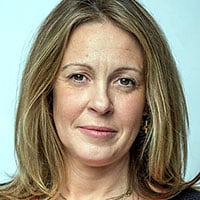A voice for the voiceless
By Clive Whittingham
16-06-2017
I’m not going to pretend that my six years on the factual TV circuit is a particularly long time. Regular readers will, I’m sure, have been at this a lot longer than me. But it is certainly long enough to know the stock phrases you hear year after year, event after event, panel after panel, interview after interview.
Commissioners wary of giving too much away to a rival (they’re going to find out anyway, you know – it’ll be on the television) are always good for a round of ‘quote bingo’ when asked, “What are you looking for?”
Eyes down for the likes of, “We wouldn’t want to rule anything in or out” and the always incredibly useful, “A good story is a good story.” And the thorny issue of budgets is almost guaranteed to elicit, “It costs what it costs.”

David Glover
Not exactly useful stuff for producers, is it? Is it any wonder the pitches they receive are a bit samey and derivative. Massive credit to Sheffield Doc/Fest, and particularly former Channel 4 commissioner David Glover, now at his own indie 72 Films, who completely tore up the standard format for his Documentary Commissioners Question Time panel on Tuesday and produced a lively, entertaining and, more importantly, informative session as a result. More Glover please and more like him.
Another stock phrase at the documentary-based events such as Sheffield Doc/Fest is this idea of providing “a voice for the voiceless.” In the feature doc world, that’s a pretty sure-fire guarantee that you’re about to sit down to 120 minutes from Palestine or the Arab Spring countries. (No hate mail please – these are, of course, incredibly important and worthy topics.)
In television, the debate is framed around diversity, in front of and behind the camera. Comedian and actor Lenny Henry used his appearance at Sheffield this week to criticise media regulator Ofcom and the Creative Diversity Network’s Diamond scheme for not doing enough to record, report and increase the amount of black, Asian and minority ethnic (BAME) participation in TV production. The diversity-in-TV debate rarely steers too far from race, sexuality and gender.
But for me, the timing and location of Doc/Fest this week highlighted who the voiceless really are, in the UK and the television industry. This is about class – working, middle and upper.
The event came just a week after the snap UK general election, called by the ruling Conservative Party because it was so confident of increasing its slight majority against apparently non-existent opposition. It ran on a manifesto that included making the elderly sell their homes to pay for dementia care and taking away free school dinners from families on low incomes.

Sheffield Doc/Fest screenings venue The Showroom
The theory was the Conservatives could promise free cigarettes to primary school children and still win a big majority because the opposition was so weak. They tested that theory to its limit and were delivered a bloody nose by younger and working-class voters weary after eight years of austerity. The less well-off aren’t doing what the elite tell them to any more.
By the end of the week dozens had been killed and injured in a fire in London in exactly the sort of tower block the very poorest have been parked in and forgotten about in Britain for too long. Quickly it emerged that the residents had repeatedly contacted the council in the wealthy borough of Kensington to say that a recent refit and other longer-standing issues had made the building a fire hazard and a death trap.
They’d not only been ignored but been sent legal letters asking them to remove these claims from internet blogs. The death count at the time of writing is 30 and nobody expects it to stay there.
The voiceless in Britain are its poorest, particularly outside London and particularly down the east side of the country. And the television industry ignores them just like everybody else.
Doc/Fest may be in Sheffield but there is no independent television production here.

Andrew Sheldon
Nor down the road in Hull, or further north in Newcastle Upon Tyne, Sunderland, York, or further south in Nottingham and Leicester.
There will be working class boys and girls on council estates in these cities with stories to tell and things to say, maybe even the odd degree in TV and film studies in their back pockets, who don’t even have a local indie where they can go for two weeks’ work experience. London is their only hope, with its extortionate rents and unscrupulous, uncaring landlords and tenant management associations. To get there probably requires parental support, and so our industry doesn’t get them – or certainly not enough of them.
Kim Shillinglaw, formerly controller of BBC2 and now head of factual at Endemol Shine, believes this is a key issue. “There is understandable and legitimate talk about diversity in television; thankfully it’s become a big issue. What is less of a talking point, and is a real problem, is class representation behind the camera,” she says.
“To come and work in London if your parents are not from London is really difficult. It’s difficult even if you’re lucky enough to land a paying job, and our industry’s entry level often requires you to self-fund yourself through work experience and runner jobs. By saying that’s OK you perpetuate a situation where kids from reasonably well off London families get the first leg up.
“We have to look at this as an industry and if we don’t then we only have ourselves to blame if other forms of expression and communication – be it social media, YouTube or anything else – start to feel more relevant to people’s views,” Shillinglaw adds.

Kim Shillinglaw
It’s a problem the Conservatives’ disastrous election manifesto – which now lies in tatters as it tries to cobble together a deal with Ulster’s Democratic Unionist Party to remain in power – is trying to address by moving Channel 4 from London to Birmingham. The theory is that a production sector will grow around it.
But Channel 4 is not in favour and Shillinglaw, along with other execs who have been banging this drum for some time, gave the idea a lukewarm reception at best when C21 spoke to them this week.
“The idea of moving to Birmingham isn’t worth much,” said Andrew Sheldon, creative director of Leeds-based production outfit True North. “It’s much more about production spend. I would rather see a quota that, while not giving people a free pass, does increase spend in the places it’s needed.
“If people are to have a chance of working in the industry they have got to have some production on their doorstep and the only way we can do that is by contriving it. If you could put two daytime series from the BBC and Channel 4 in Newcastle it would start to regenerate the production business there, then you’d see people from those places and their views represented on screen.”
Jez Lee, a native of Rochdale and exec producer at 7Wonder, which has a Birmingham office, adds: “I was very lucky. I came to London working in a different industry and saved up some money to work in television. People can’t afford to live in London; it’s increasingly out of reach, so you’ll get the same sort of people working in the TV industry as they’re the only ones who can afford it.
“The Birmingham office gives us reach and brings different voices into the company. But there needs to be some agglomeration about it because otherwise there’s no talent base there. If you were to be the first company to open in Hull, for instance, that would be a brave move, because is there a production base and workforce there to support the business? If a broadcaster is willing to put commissioning in a city then you build a regional hub and it will grow around that.
“Whatever they do with Channel 4 it would need to be managed and meaningful. I wouldn’t move a broadcaster lock stock and barrel, but you could move elements of it, particularly commissioning, to make it a meaningful move.”
The Brexit vote, the general election vote, the Grenfell Tower fire in London… Britain is quickly waking up to a previously ignored and unheard swathe of its population. Public service broadcasters have a duty to serve these people, and TV in general would be deeper, richer and less derivative thanks to their views and ideas.
Television and documentary makers would do well to realise that giving a ‘voice to the voiceless’ isn’t just about filming in the Middle East or finding a lesbian Muslim or a transgender Hasidic Jew. It’s about waking up to the industry’s class issue before that class goes looking for relevance elsewhere.

















.jpg)




























